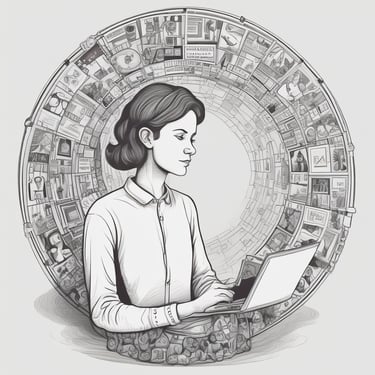Essays and Conversations on Community & Belonging
Unsubscribing from the Newsletter Generation
Social media commodifies our lives in a low-bandwidth attention economy. That's why digital communications feel so empty. Contrasting the "low-bandwidth" nature of social media versus the richness of analog connection, and the choice to recover from the attention economy.
DIGITAL LIFE & THE ATTENTION ECONOMYSIGNAL V NOISEANALOG DISSENTPERFORMANCE V AUTHENTICITYHIGH-BANDWIDTH SIGNAL
Alex Pilkington
9/30/20253 min read


A persistent concern arises regarding the fundamental inadequacies of communication. We grapple with the ambiguity of language, the potential for misaligned interests, and the sterile, one-dimensional nature of digital text. These are not merely personal anxieties; they are symptoms of a broader tension between the complexity of human connection and the systems we have engineered to facilitate it.
It should come as no surprise that new relationships, which demand clarity and deliberate expression, can prove challenging. The standard operating procedures of social deference and concealment of one's true desires are often survival mechanisms in a world of uncertain social signals. When circumstances demand directness, the mind, accustomed to the protective layers of ambiguity, may resist. This creates a paradox: we employ ambiguity as a shield, yet we often interpret ambiguity from others as a form of rejection which reveals more about our risk calculations than about the other party's intent.
This points to a fundamental truth about human interaction: it is an analog, high-bandwidth experience that cannot be perfectly replicated by digital means. Consider the nature of a substantive, in-person conversation. It is a spontaneous order, a complex dance of inputs and outputs. The subtle shift of a person’s feet reveals subconscious diversions of attention. The micro-expressions of an eyebrow convey a disposition that words alone cannot. The tone, pace, and volume of a voice provide layers of context. Even the use of hand gestures, often dismissed as mere psychomotor agitation, can be integral to linguistic recall and the very structure of thought. These are not trivial details; they are essential data streams in the processing of meaning and intent.
In stark contrast stands the modern digital commons. Our social networks, once marketed as revolutionary tools for maintaining connection, have evolved into something else entirely: a market for attention. The incentive structure has shifted from fostering relationships to competing for engagement. Every life update becomes an installment in a personal newsletter, where information is shared with maximum efficiency but minimal effectiveness. The platforms are not neutral conduits; they actively shape our behavior.
This has led to the commodification of human experience. As the writer Freya India so astutely observes, our lives risk becoming mere content for the consumption of others: "Your precious memories are my mindless entertainment. Your trauma becomes my background noise... And if you fail to entertain me, fine, I will scroll for another life to consume."
In this attention economy, some of the most profound events of life such as graduations, travels, and personal tragedies are flattened into commodities, and packaged for an audience of friends, family, and strangers. This fosters a culture of constant performance, where validation is sought not through genuine connection and intimacy but through the aggregated metrics of a platform designed to addict.
We worry about future machine learning that could tailor these "newsletters" to each individual's taste, but the current system is already a powerful engine of social standardization.
Confronted with this reality, the individual is left with a choice. To continue participating in a system that devalues authentic communication, or to exercise the right of exit. The conclusion that genuine connection cannot be reclaimed through a social media post is a rational one. Therefore, the decision to step away is not an act of surrender. It is an assertion of personal sovereignty. While the fear of relapse into the algorithmic feedback loop is real, it is a risk inherent in breaking from any compulsively engineered system. The path to more effective communication, it seems, may not be found in a more curated feed, but in a deliberate disconnection and an assertion of individual choice in an age of algorithmic compulsion.
This October, in addition to touching grass, I am committing to writing personal notes and making phone calls. To overcome the reliance on ambiguity that one-to-many social media platforms offer, I will engage fully in face-to-face interactions, embrace the natural hesitations of conversation, and avoid using any editing software.



